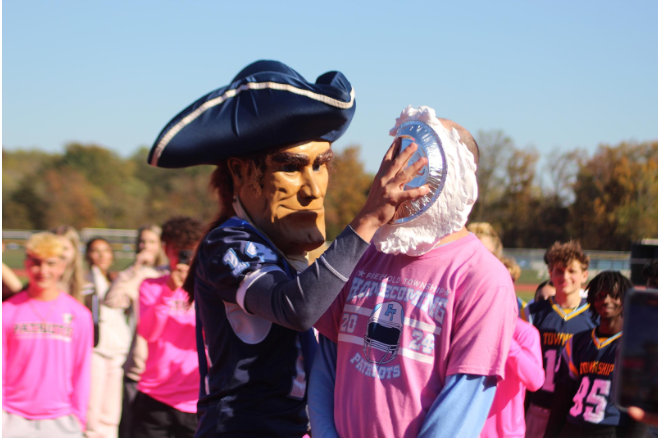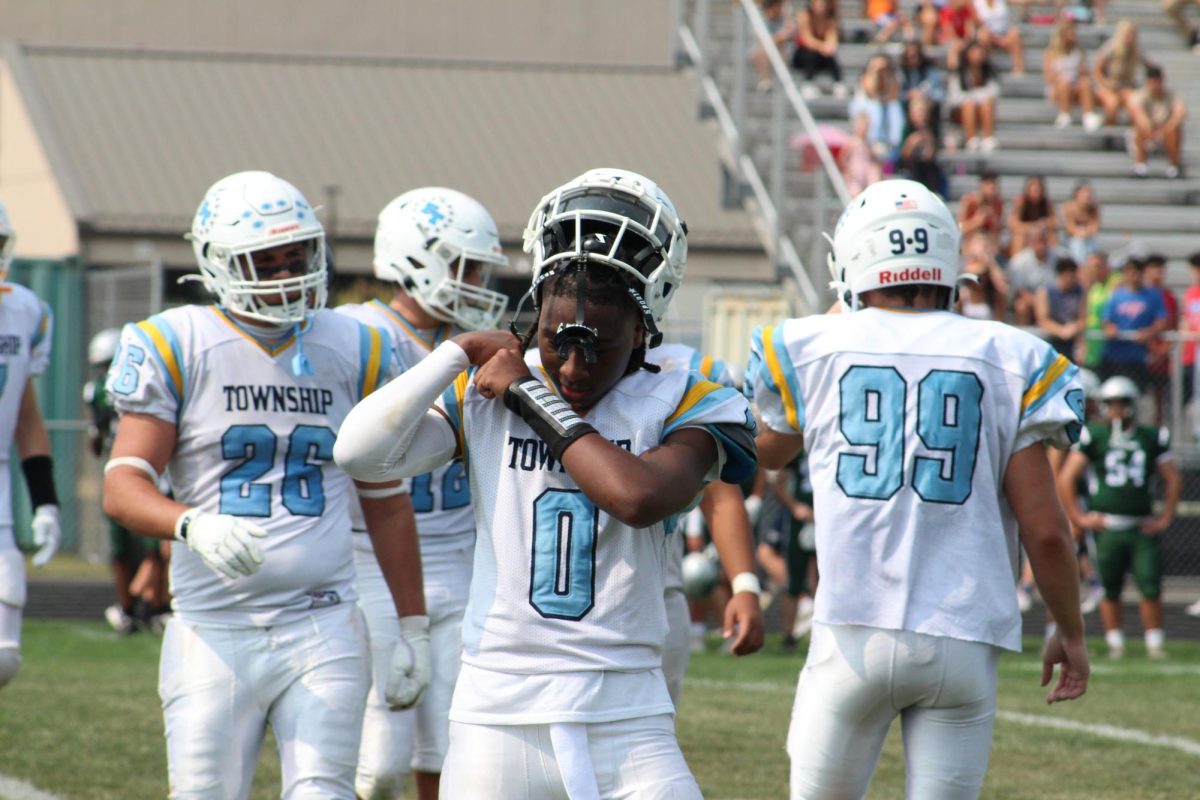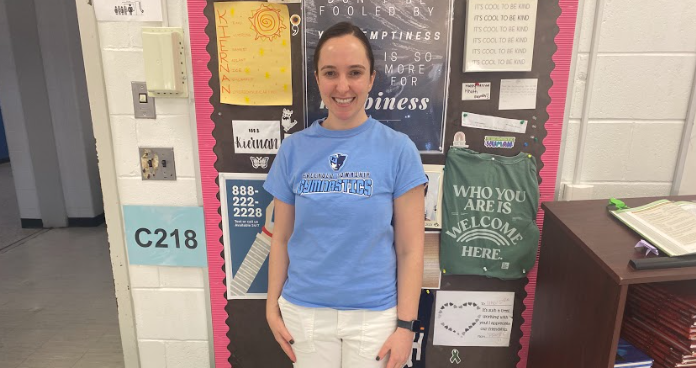An Interview With Ms. Kiernan: Township’s “Compassionate Counselor”
March 8, 2023
The votes are in! On Tuesday, February 21, 2023, the final winners for the fourth annual Peary Awards were announced. According to the official Peardeck website, the Peary Awards “celebrate outstanding educators and schools who embody Pear Deck’s values and create powerful learning for every student, every day.” Students, teachers, and administrators alike were thrilled upon finding out that the winner of the Compassionate Counselor award–a title given to an educator who provides guidance to students as well as excels at helping them gain empathy for each other’s different emotions–was none other than Freehold Township High School’s own Ms. Kiernan. In order to celebrate the news, I sat down with her in order to learn more about her feelings on the win, her perspective on mental health awareness, and so much more.
Read the full interview here:
───────────────────────────────────────────────────────────────────────────────────────
First of all, I wanted to say congratulations once again! I’ve said this to you before, but I really want to reiterate that I feel you are the teacher who completely and truly deserves this.
– Thank you!
I guess I’ll start just with asking– what does winning the National Peary Award for Compassionate Counselor mean to you?
– Man, I didn’t realize I would have to think so hard! I think for me, it really shows how much my students appreciate my work on mental health in the classroom, and how much it impacts them. It also really shows how important focusing on mental health in the classroom is, and how much they need it–especially after COVID. It is so important to check up on our students and make sure they are okay, because sometimes they’re not–nobody really is right now. People are slowly getting back into a place where we do feel normal, but not everyone is there yet, and that’s okay.
I totally agree! Having been in your class last year, I know that one of my favorite things that we did was our mental health check-ins where we could talk about positives, negatives, and good deeds from our weekend, but we learned that the negatives were just as important as the positives because we didn’t have to bottle them up. This correlates somewhat into my next question, which was why you decided to become a Latin teacher, just in general.
– [Laughs] What made me decide to become a Latin teacher? So, my story is, originally I grew up pretty not-wealthy. My family didn’t have a lot of money, and it was always a struggle my entire life. My parents would always say to me, “Meg, you gotta go on, get a good job, make a lot of money, and not be in this position where you’re stressed, you’re worried about money, and worried about paying your bills, especially with medical expenses”. So, I thought my number one purpose in life was to go on, get a business degree, make a lot of money, and then my life is good—so I did that. I studied Business at Rutgers, I did really well, and I even had a job where I was running a business. And then I realized, that wasn’t happiness. Money is not everything in the world. So, I always knew I wanted to be a teacher, and I wanted to do that down the line after I made all this money and had a successful life. And then working in business, I realized that wasn’t what made me happy. That’s what made me decide to pivot and be a teacher. It was the best decision I’ve ever made.
That sounds amazing! One thing I know that you’re a big advocate for is incorporating mental health awareness in schools. How important do you feel that, as mental health is becoming more of a widespread topic, it is for it to be discussed in educational settings to break the stigma?
– I feel like, in high schools, we spend so much time on things like quadratic formulas, on MLA format, on the cases in Latin, and when we spend so much time focusing on that, it trains us to think that our entire life is: work, school, study, and following this formula of our life revolving around work and schoolwork, whereas that should only really be 60% of our life, or even 40%. It is so much more important to realize that we are our individuals and we all have different feelings, and we all cope, and have different emotions, and handle things differently. So I think it’s so important–and schools are starting to catch on now post-COVID–that if we don’t focus on these things and don’t know how our students are doing mentally, they’re not going to be okay. And, not every student has a great home life. That’s something I try to tell myself all the time as a teacher. I may think that every child has a healthy, loving family at home, when, in reality, maybe only ⅓ of our students come and have a good, confident loving family. So, I think, as much as it’s not a teacher’s job to raise children and be their support–that’s the job of parents, therapists, and family–but it’s important for us to realize in school that not every child has a support system at home, and not every family can afford therapy for their kids. So, it’s so, so important for schools to just check in, like I do. They don’t have to be therapists; even our guidance counselors, that’s not their job, either. Just to see if there’s something going on that’s affecting the student, and when a student’s mental health is bad, that affects their classroom performance as well, and no student who is struggling with their mental health, whether it’s depression, anxiety, suicidal thoughts, or anything–even just going through a rough time at home–anyone who’s going through that, it is so much harder for them to do well in school. In schools, if we want our students to succeed, we always have to put their mental health and mental well-being before the Latin case system, and things like that.
I completely agree, and I think something that you mentioned that we all saw was, after COVID, which was something that was so unprecedented, we didn’t know how it would affect our world. Even though things are much better now, there are still remnants of that. Do you think that one of the few positive results from the pandemic is that people are discussing mental health more regularly?
– Definitely, definitely. I would say, before COVID happened and I started focusing on mental health more in the classroom, I actually got a negative response from some people, that I shouldn’t be doing this, and I shouldn’t allow students to talk about their negatives. And that’s actually why, even before COVID, we saw a raise in suicidal thoughts, in depression, in anxiety levels. In our life, we pushed away the negatives, and acted like they don’t exist–ignore them, only talk about the positives. And, that’s not how life works. We all have negatives that go with our positives, and sometimes we have way more negatives than positives. Talking about mental health in the classroom was not something that was welcomed before COVID. And now, after COVID, although it’s still tricky because, as a teacher, I’m not a therapist, I’m not a trained counselor by any means, but I do think it’s important to talk to students just to let them know, “Hey, if you’re not doing okay, there are trained people for you”. Even going to talk to Mom and Dad, saying, “Hey Mom and Dad, I need to talk to somebody”. And I feel like parents, teachers, students, everybody’s more open to having those conversations now because of COVID, because it made us more aware that a lot of us are dealing with these negative emotions. It may have been that we were locked in our home for three or four months, and that made us more aware of those negative emotions. Which is why now, post-COVID, we see them so much more and are able to have those conversations about them.
Finally, what, in summary, would you like people to take away from this interview when it comes to breaking the stigma of spreading compassion or discussing mental health?
– So, I’m not trying to sound arrogant or full of myself, but I do come off–and my students would probably agree with me–as a very happy person. My colleagues could probably tell you that as well. That happiness is not something that is found in everybody. It took a lot of years of struggling with my own depression and anxiety, all the way from high school, when I lost one of my best friends at 18, it really just set my mental health in a direction that wasn’t great. And all of my friends at the time, all of my teachers when I was 18, said, “Oh yeah, Meghan’s happy, there’s nothing wrong with her”, and I would have probably even said that I was happy, but I didn’t realize what I was struggling with deep down inside because I always pushed away those negatives, like we talked about before–they didn’t exist. And then as I got older, with the weight of graduating high school, college, finding a job–all those burdens, they grew and grew and grew. Finally, I couldn’t take it anymore; I would have burst. So, I think it’s really important that we realize that somebody isn’t automatically happy one day. Similarly to how we can work out to take care of our physical well-being–and if we don’t work out, we can get out of shape, we can become unhealthy, but if we stick to working out, we can be much more healthy. It’s kind of the same thing with our mental health. If we don’t work on our mental health, whether through therapy, through things like meditation, spending time with friends, taking time to look at both the negatives and positives in life, our mental health will become unhealthy just like with our physical health if we didn’t work out. So I think it’s so important for us not to judge people–anyone, ever–whether they’re going through a hard time, or just need someone to talk to, because you never know what someone is facing on the inside even if they appear happy on the outside. I think it is so, so important that, whenever we see someone struggling, that we encourage them like, “Hey, I know you’re going through a rough time right now. Have you ever thought about talking to someone, whether your parents, a guidance counselor, a therapist, some kind of trained professional?”, and that we remind our friends and family that the option is always there.
Thank you so much for your answers, and congratulations again!
– Thank you, thank you!














































